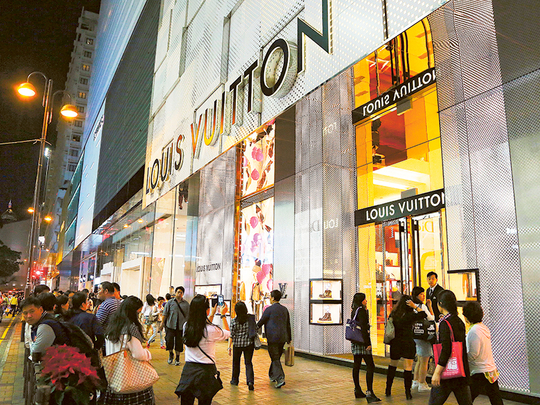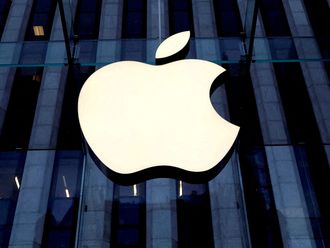
Paris: When luxury group LVMH announced that it was hiring Ian Rogers to head its digital strategy, the news sent tremors through Silicon Valley and beyond.
Not only was the guru of online music turning his back on a role at Apple — one that he had earlier called his “dream job” — he was also going against the flow of talent that has swept several other senior luxury goods executives into digital businesses.
In 2013, Paul Deneve, chief executive of Yves Saint Laurent, shocked the industry by becoming Apple’s new vice-president for special projects. Last year, Angela Ahrendts, Burberry’s chief executive, swapped her prominent role in the fashion world to become Apple’s head of retail strategy. And at Apple’s San Francisco product launch event, French fashion house Hermes was named as the US tech group’s design partner for a new range of smartwatches.
By reversing this direction of travel, LVMH’s appointment of Rogers suggests the €224 billion (Dh928.96 billion) a year luxury sector is finally getting serious about digital. But it also leaves investors to wonder what a company that owns such brands as Louis Vuitton, Fendi, Chateau D’Yquem and Krug expects to gain from a man more closely associated with the Beastie Boys than €36,000 handbags and bottles of fine wine.
For some years, luxury groups have been aware of the potential dangers that the click economy poses for products that have relied on old-economy processes to justify their high prices.
Behind the doors of Hermes’ leather workshop on the north eastern outskirts of Paris, this is plain to see: dozens of highly trained artisans spend their day painstakingly hand-stitching pieces of carefully selected skin — calf, crocodile, ostrich or even lizard — to make bags that will sell for tens of thousands of euros each.
It may all take place a stone’s throw from the capital’s traffic-choked Peripherique ring road, but most of Hermes’s production methods have remained self-consciously unchanged since the company was founded in 1837.
Even so, Luca Solca of Exane BNP Paribas says that luxury’s hitherto wary attitude towards digital sales and marketing is changing fast. “Saying that an overwhelming portion of growth will come from digital is a wild underestimate,” he wrote in a recent report.
“A more accurate statement is that the whole luxury industry is finally morphing structurally into ‘something new’ — the same way as, for example, financial services and travel did a long time ago.”
One of the forces behind the shift to digital is luxury’s changing clientele — a group of wealthy customers increasingly comfortable with e-commerce. This trend is particularly clear in the UK and Germany, where online luxury sales have grown from less than 3 per cent of the national total in 2010 to roughly 12 per cent last year.
Chinese consumers are another significant driver of technological change - and are forecast to account for about 30 per cent of global luxury sales this year. As Antonio Belloni, LVMH’s group managing director, told the FT: “Chinese customers have shown a level of digital adoption that is unparalleled. But it is happening to everyone.”
In addition, luxury consumers tend to be more connected than others: a study by McKinsey and Fondazione Altagamma found that luxury clients have more digital devices than average shoppers. It concluded that, while online luxury sales currently make up only about 6 per cent of the global total, they could reach 18 per cent by 2025.
However, Solca argues that measuring e-commerce alone in the luxury sector underestimates the digital dimension — because it ignores the fact that 21 per cent of luxury in-store sales last year took place only after the customers had researched online first. Solca calls this wider picture “the digital luxury playground”.
He argues that this proves the need for a strong online presence. “Separating digital and physical luxury will make no sense,” Solca says. “Digital execution will define success or failure for luxury brands.”
Step forward, LVMH’s new recruit. Belloni says that hiring Rogers marks an inflection point in the group’s embrace of digital. For the past four-and-a-half years, he says, LVMH has invested heavily in digital - mostly in the online presence of the group’s biggest brands but also to spread best practice to all of its brands.
Now, he believes the group needs Rogers’s flair for innovation — although he declines to elaborate on how it will be applied. “He is there to take us to the next level,” says Belloni. “He has built a career with the best in the industry and he has shown a great deal of innovation in the industry.”
Few people would dispute that. Rogers was part of a team that joined Apple last year when the tech company spent $3 billion to acquire Beats, the audio group started by Dr Dre and Jimmy Iovine. Before his surprise departure in August, Rogers had been put in charge of Apple’s online radio strategy, launching its Beats1 radio service just two months ago.
LVMH is not alone in seeing the potential for digital initiatives in brand-building. Paris-based Hermes continues to invest in bricks-and-mortar stores but wants to use digital as a channel through which it can enhance the story behind its products.
“We need to make sure we stay true to our brand while making use of the convenience of the internet,” Axel Dumas, Hermes’ chief executive, told ‘Style’ magazine recently.
“Hermes is about telling a story, and the digital world is a great way to tell a story, to create dreams.”
Kering, the Paris-based luxury group that owns a host of brands including Gucci, Balenciaga and Girard-Perregaux, is investing in digital, too. Jean-Francois Palus, managing director, said earlier this year that digital was “a priority”.
Presenting the group’s 2014 results, he said: “Our intention is to make it possible for our brands to turn their websites into showcases, where we can really become immersed in their world.”
Gucci, itself, has long embraced digital. But in 2012, Kering set up an e-business platform to provide all of its brands in the couture and leather goods division with the technical know-how to develop online businesses and strategies.
Belloni of LVMH believes that the internet provides such a compelling space for “romancing the brands” that it could even start to beg questions about the bricks-and-mortar side of the business.
“Digital puts a burden on our service in-store to really raise the bar,” he says. “I love my online banking experience on Sunday morning more than the drag of going to the branch; stores need to become more like moments of magic, beautiful and extraordinary experiences.”
— Financial Times










